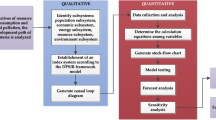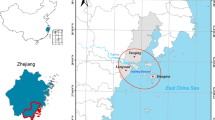Abstract
The marine functional zoning (MFZ) for China is a new large-scale, ecosystem-based zoning policy for management of development and use in the marine environment. The system dynamic (SD) method is used to evaluate the utilization effectiveness of existed marine functional zones (MFZs) quantitatively for China. As a case study, an impact assessment system is constructed to obtain the cause and effect feedback chart of the mariculture functional zones in Qingdao city, China. A feedback SD model and the main control loops are developed to analyze the utilization effectiveness of the mariculture functional zones. Vensim software is applied to the assessment for the mariculture functional zones of Qingdao. Analysis results and simulations are presented to verify and validate the proposed model.
Access this chapter
Tax calculation will be finalised at checkout
Purchases are for personal use only
Preview
Unable to display preview. Download preview PDF.
Similar content being viewed by others
References
Luan WX, A.D.: The functional programs of marine functional division of China. Human Geography 17, 93–95 (2002)
Wei, X.: On the determination standards of the compliance between sea areas for developing projects and marine functional zoning. Ocean Development and Management 7, 4–7 (2010)
Wang, J.T., Xu, W.: Construction and evaluation of the assessment indicator system of exploration potential of marine functional zone. Marine Science Bulletin 6, 1–6 (2009)
Zhang, G.H., Li, X.: Marine Functional Division in Qingdao City. Territory and Natural Resources Study 4, 5–7 (2006)
Miao, L.J., Li, S.Y.A.: Discussion of method of classified sea area use grading. Management Geological Science and Technology 22, 75–77 (2005)
Wang, J.J.T., Liu, B.Q.: Preliminary study on the compatibility discrimination methods of marine function zoning: A case study of port functional zones. Marine Science Bulletin 30, 496–501 (2011)
Vince, J.: The South East regional marine plan: Implementing Australia’s oceans policy. Marine Policy 30, 420–430 (2006)
Hall, T.: Advancing objectives-based, Integrated Ocean Management through Marine spatial planning: current and future directions on the Scotian Shelf off Nova Scotia, Canada. Journal of Coastal Conservation 15, 247–255 (2011)
Gopnik, M., Fieseler, C., Cantral, L.: Coming to the table: Early stakeholder engagement in marine spatial planning. Marine Policy 36(5), 1139–1149 (2012)
Douvere, F., Ehler, C.N.: New perspectives on sea use management: Initial findings from European experience with marine spatial planning. Journal of Environmental Management 9, 77–88 (2009)
Qiu, W.F., Jones, P.J.: The emerging policy landscape for marine spatial planning in Europe. Marine Policy 39, 182–190 (2013)
Wang, Q.M., Miao, F.M.: Overview of foreign marine spatial planning and its impact on Chinese marine functional zoning. Ocean Development and Management 25, 45–49 (2008)
Gimpel, A., Stelzenmüller, V., Cormier, et al.: A spatially explicit risk approach to support marine spatial planning in the German EEZ. A spatially explicit risk approach to support marine spatial planning in the German EEZ. Marine Environmental Research 13 (2013)
Suárez de Vivero, J.L., Rodríguez Mateos, J.C.: The Spanish approach to marine spatial planning. Marine Strategy Framework Directive vs. EU Integrated Maritime Policy. Marine Policy 36, 18–27 (2012)
Collie, J.S., Adamowicz, W.L., Beck, M.W., et al.: Marine spatial planning in practice. Estuarine, Coastal and Shelf Science 117, 1–11 (2012)
Halpern, B.S., Diamond, J., Gaines, S.: Near-term priorities for the science, policy and practice of Coastal and Marine Spatial Planning (CMSP). Marine Policy 36, 198–205 (2012)
Stelzenmüller, V., Lee, J., South, A., et al.: Practical tools to support marine spatial planning: A review and some prototype tools. Marine Policy 38, 214–227 (2013)
Gao, Y.M., Zhou, L., Qu, P.: Evaluations on the utilization effects of marine functional zones based on system dynamics. Journal of Ocean University of China (Social Sciences) 4, 15–20 (2011)
Sterman, J.D.: System Dynamics Modeling. California Management Review 43, 8–25 (2001)
Author information
Authors and Affiliations
Editor information
Editors and Affiliations
Rights and permissions
Copyright information
© 2013 Springer-Verlag Berlin Heidelberg
About this paper
Cite this paper
Wang, H., Li, M., Hu, N., Gao, Y. (2013). A System Dynamic Based Utilization Effectiveness Assessment Method of Marine Functional Zones in Qindao, China. In: Bian, F., Xie, Y., Cui, X., Zeng, Y. (eds) Geo-Informatics in Resource Management and Sustainable Ecosystem. Communications in Computer and Information Science, vol 398. Springer, Berlin, Heidelberg. https://doi.org/10.1007/978-3-642-45025-9_43
Download citation
DOI: https://doi.org/10.1007/978-3-642-45025-9_43
Publisher Name: Springer, Berlin, Heidelberg
Print ISBN: 978-3-642-45024-2
Online ISBN: 978-3-642-45025-9
eBook Packages: Computer ScienceComputer Science (R0)




